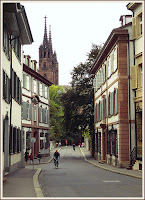Basel is a cultural center with more than 60 museums. The city's special geographical situation bordering both Germany and France has brought forth peculiarities, such as three railway stations in the town center and a trinational airport. It is also a city steeped in legend, most of which is fervently believed by its inhabitants.
Celts had inhabited this place since the 5th century B.C. A town seems to have been in place around 150 B.C. which was later fortified by the Romans as a fort against the barbarian German tribes to the North. After the Romans left around 400 AD, the Alemanni took over but were soon swallowed by the expanding kingdom of the Franks. By 900 the city was part of the kingdom of Burgundy and with it passed by deed of will to the Holy Roman Emperor in 1032. The first bishop is mentioned around 740 and he seems to have ruled the city. In 917, the town was completely destroyed and plundered by the Magyars.
In 999, the bishop was made a prince of the realm by the kings of Burgundy and retained the title until 1806. In 1225, Bishop Heinrich of Thun had a bridge built over the Rhine River which built the foundation of the riches of the town. It was for a long time the only bridge between Lake Constance and the North Sea. In 1348, half the population fell to the pest, and in 1356, 90 per cent of the town were destroyed by an earthquake and subsequent fires.
From 1431 to 1449, Basel was the center of western Christendom. The Council of the Roman Catholic church was held in the city. It was due to all the cardinals and secular notables being present present in the city that the news of the Battle of St Jakob was news all over Europe within weeks of it occurring in 1444. The battle was fought outside the town walls. 1,500 soldiers from the Swiss Confederation were defeated by 40’000 soldiers of the French king in a ten hour battle. The cost to the French was so high that the king withdrew his army and conceded the field to the Swiss. It is believed that 6,000 French soldiers were killed outright, not counting the wounded. Nobody really cared to attack the Swiss Confederation after that.
In 1459, the Pope Pius II donated a university to Basel, and in 1471, the Holy Roman Emperor granted the the city the privilege of holding a yearly fair. The fair is still held every year in November and is considered the oldest in Europe. The University drew notable scientists to Basel, such as Erasmus of Rotterdam, Paracelsus, and Holbein. In later days the University brought forth such genies as the members of the Bernoulli family or Leonhard Euler. Members of the Bernoulli family held the professorship for mathematics at the university for 105 consecutive years. In 1501, Basel joined the Swiss Confederation or more correctly Oath Fellowship.
After the Napoleonic wars, Basel gained full independence. Bern and Basel split between them the lands that had formerly belonged to the prince-bishop of Basel. With the founding of the United States of Switzerland (Confoederatio Helvetica) in 1848, Basel lost all political influence in Europe and most of it in Switzerland. In the late 19th century, Basel became a center for the emerging pharmaceutical and chemical industry and it remains a major player to these days. Apart from a historical city center, Basel hosts over 60 museums with many collections of international importance.
The language spoken in Basel is Alemannic with a strong French influence. The other Swiss make fun of the city for its unshakable belief of being on a par with New York, Paris, and London where culture and the arts are concerned. It is said that you may joke about everything in Basel, as the people have a high regard for the ridiculous, except about their carnival. They take that very seriously and execute it with military precision.
Every year, Basel hosts the World Jewelry and Watch Fair, the largest of its kind in the world, and the Art Fair for modern art considered the most important art event anywhere. Spin-off Art Fairs are held yearly in Miami (Basel Art Miami) and in Hong Kong (Basel Art Hong Kong). And besides that: The Swiss National Day is the 1st of August being observed with a holiday and fireworks everywhere in Switzerland except in Basel, where the fireworks and the parties are held on the 31st of July so people may sleep off their headaches during the bank holiday.
For further information on the city of Basel you may want to go to the official homepage of the city government basel.ch.









No comments:
Post a Comment